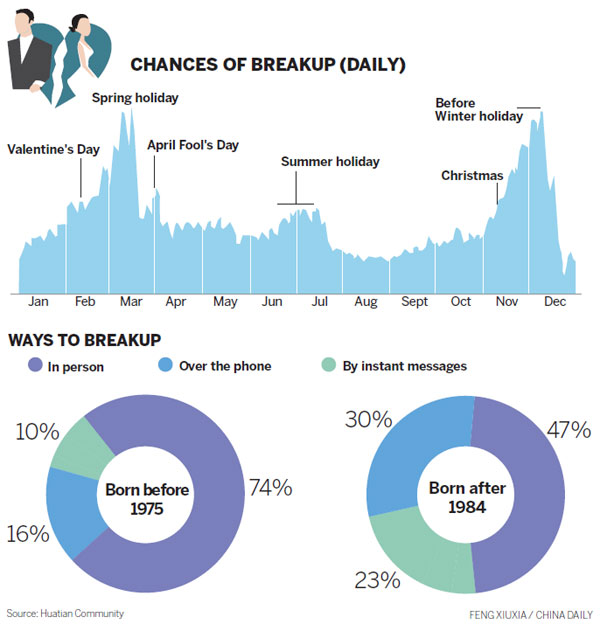Computer love

The concept of big data is new in China, where most online users were born after 1980. This online generation is now at an age where many wish to get married.
Unlike their parents who mainly relied on match-making by relatives, friends and colleagues, nowadays young people, living in big cities with busy lifestyles, have little time to seek partners. Instead they turn to the Internet for help.
Qu Xin, a university lecturer in East China's Anhui province, got her first account on QQ, a Chinese instant message service, in 2000 when she was only 15.
"I began to hear about love affairs on the Internet. The media at the time was very critical of online romance, and my parents didn't allow me to use QQ. But I still chatted online in secret," Qu says.
The 28-year-old has received many flirty messages through QQ. She also has accounts on other Chinese social media, such as micro blog Weibo, and Wechat, a popular mobile messaging application. But none has helped her find Mr Right.
"I often chat with guys online, but most of them are already my friends in real life. If it doesn't work out in real life, it wouldn't work out on the Internet," she says.
Qu has registered on several online dating sites and hopes find a boyfriend through them.
According to China's Department of Civil Affairs, China's single population of marriageable age was 180 million in 2013. Despite the huge number, finding a soul mate has never been easy for young Chinese.
"Love is still beyond the understanding of science," says Ji Xiaohua, CEO and founder of China's popular science website guokr.com.
He says big data can improve the odds in favor of a successful communication. "For example, well-educated young people will find it easier to meet someone in a big city than in small ones, as in big cities there are more people with a similar background. Big data can help to filter out a group of people with similar hobbies and interests on a larger scale, providing a better match than a blind date," Ji explains.
But he also points out the limited role by big data. "So far, the science of biology failed to analyze or understand love. When people fall in love, they make decisions both consciously and subconsciously. Big data can only cover the conscious factors, while the subconscious part is still a mystery for now."
However, Xia Tianyu and his team of engineers are still working on it. The team put together a speed dating event last Valentine's Day. One hundred applicants were selected from 1,000 volunteers and matched by computer during the event.
But before the computer determined the 50 pairs, the would-be lovebirds had already made their own, unscientific choices. Big data matching was challenged, as some participants wanted to choose their dates based on their own criteria, and not follow the mathematical matching spewed out by a computer.
"Machines and technology can't take the place of real-life communication," Xia says. "But I hope one day, it will solve all human mystery, including love."


















